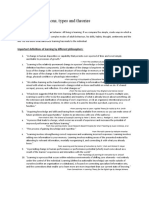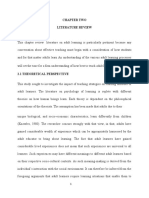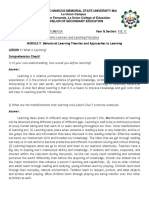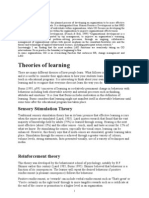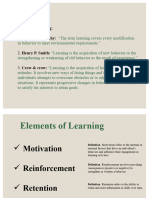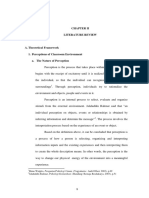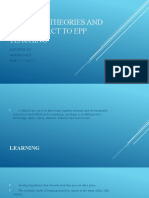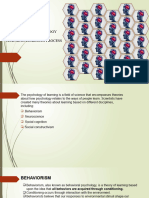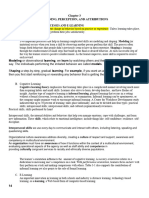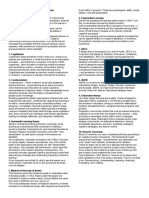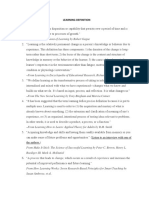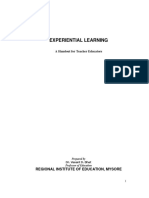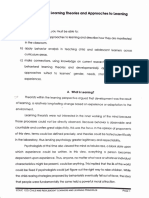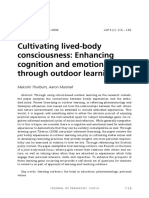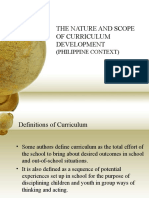0 ratings0% found this document useful (0 votes)
38 viewsTheoritical Framework: The Nature of Self-Learning
Theoritical Framework: The Nature of Self-Learning
Uploaded by
Tessa Lonka TenidoThis document discusses the theoretical framework of perception of self-learning modules. It defines perception as how individuals receive and interpret sensory information from the environment. Self-learning is defined as individuals taking initiative to diagnose their own learning needs, set goals, and evaluate outcomes, with or without help from others. Modular learning focuses on connecting learning outcomes to student learning and course design. The document provides background definitions and context to understand perception in the context of self-learning modules.
Copyright:
© All Rights Reserved
Available Formats
Download as DOCX, PDF, TXT or read online from Scribd
Theoritical Framework: The Nature of Self-Learning
Theoritical Framework: The Nature of Self-Learning
Uploaded by
Tessa Lonka Tenido0 ratings0% found this document useful (0 votes)
38 views2 pagesThis document discusses the theoretical framework of perception of self-learning modules. It defines perception as how individuals receive and interpret sensory information from the environment. Self-learning is defined as individuals taking initiative to diagnose their own learning needs, set goals, and evaluate outcomes, with or without help from others. Modular learning focuses on connecting learning outcomes to student learning and course design. The document provides background definitions and context to understand perception in the context of self-learning modules.
Original Description:
Original Title
THEORITICAL-FRAMEWORK
Copyright
© © All Rights Reserved
Available Formats
DOCX, PDF, TXT or read online from Scribd
Share this document
Did you find this document useful?
Is this content inappropriate?
This document discusses the theoretical framework of perception of self-learning modules. It defines perception as how individuals receive and interpret sensory information from the environment. Self-learning is defined as individuals taking initiative to diagnose their own learning needs, set goals, and evaluate outcomes, with or without help from others. Modular learning focuses on connecting learning outcomes to student learning and course design. The document provides background definitions and context to understand perception in the context of self-learning modules.
Copyright:
© All Rights Reserved
Available Formats
Download as DOCX, PDF, TXT or read online from Scribd
Download as docx, pdf, or txt
0 ratings0% found this document useful (0 votes)
38 views2 pagesTheoritical Framework: The Nature of Self-Learning
Theoritical Framework: The Nature of Self-Learning
Uploaded by
Tessa Lonka TenidoThis document discusses the theoretical framework of perception of self-learning modules. It defines perception as how individuals receive and interpret sensory information from the environment. Self-learning is defined as individuals taking initiative to diagnose their own learning needs, set goals, and evaluate outcomes, with or without help from others. Modular learning focuses on connecting learning outcomes to student learning and course design. The document provides background definitions and context to understand perception in the context of self-learning modules.
Copyright:
© All Rights Reserved
Available Formats
Download as DOCX, PDF, TXT or read online from Scribd
Download as docx, pdf, or txt
You are on page 1of 2
THEORITICAL FRAMEWORK
1. Perception of Self-Learning Module
a. The Nature of Perception
Perception is the world's sensory experience. It entails both identifying environmental
stimuli and taking action in response to them. We obtain knowledge about the properties
and elements of the world that are vital to our survival through the perceptual process.
According to James Rowland Angell "the consciousness of particular material things
present to sense."
According to Joseph Reitz, “Perception includes all those processes by which an
individual receives information about his environment—seeing, hearing, feeling, tasting
and smelling. The study of these perpetual processes shows that their functioning is
affected by three classes of variables—the objects or events being perceived, the
environment in which perception occurs and the individual doing the perceiving.”
On the basis of the above definition, it can be concluded that perception is a process of
how a person selects, organizes and interprets inputs of information and existing
experiences, and then interprets them to create the full means of description. In other
words, perception is the way to transform our physical energy of the environment into
meaningful experience.
b. The Nature of Self-Learning
According to Malcom Knowles, self-learning is defined as: “a process by
which individuals take the initiative, with or without the assistance of others, in
diagnosing their learning needs, formulating learning goals, identifying human
and material resources for learning, and evaluating learning outcomes”.
Research reported by Harvard Business Review also reveals that we ‘rarely
grow alone’ and that we are better equipped to learn and extend our
knowledge as a collective.
This is powering the growth of like-minded networks, especially within
organizations and teams. However, as we seek more meaningful pursuits in
our lives, the ability to learn for ourselves extends far past simply the
workplace.
c. The Nature of Modular Learning
Modular learning is the approach where the focus is on learning outcomes,
and its success relies on connecting outcomes to student learning and course
design. These areas combine to make a course constructively aligned as
discussed by Biggs (1999).
d. Student’s Perception in Self-Learning Module
You might also like
- Most Influential Theories of Learning: BehaviourismDocument3 pagesMost Influential Theories of Learning: BehaviourismIRYN TAHUMNo ratings yet
- Learning and TeachingDocument197 pagesLearning and TeachingLakshmi100% (1)
- Compilation of TheoriesDocument15 pagesCompilation of TheoriesQuenie De la Cruz100% (1)
- Nursing EducationDocument67 pagesNursing EducationIvan Exekiel CabrillasNo ratings yet
- Facilitating of Learning ReviewersDocument6 pagesFacilitating of Learning ReviewersDave MondoyoNo ratings yet
- Module 4Document4 pagesModule 4Hanz PeñamanteNo ratings yet
- Learning Full AssignmentDocument3 pagesLearning Full AssignmentAsad MehmoodNo ratings yet
- PDQ AssignmentDocument7 pagesPDQ AssignmentOkoh maryNo ratings yet
- 1) Literature Survey: LearningDocument10 pages1) Literature Survey: LearningBishwajeet MandalNo ratings yet
- Teaching Strategies Chapter TwoDocument31 pagesTeaching Strategies Chapter Twoaregbesola emmanuelNo ratings yet
- Lecture 1 PDFDocument17 pagesLecture 1 PDFIlmira ArtikbayevaNo ratings yet
- EPY 204 Week 3 NotesDocument4 pagesEPY 204 Week 3 Notesnchindabrandon70No ratings yet
- Mco-01 2020-21Document17 pagesMco-01 2020-21arun1974No ratings yet
- Untitled DocumentDocument8 pagesUntitled DocumentSana KhanNo ratings yet
- Psychological Foundation of Education EDUC 203Document38 pagesPsychological Foundation of Education EDUC 203Anthony OperarioNo ratings yet
- LEL Copy Management PracticeDocument16 pagesLEL Copy Management PracticeEdith VeronicaNo ratings yet
- EDUC 101 MODULE 5 - Basilio, Francia Neil T.Document13 pagesEDUC 101 MODULE 5 - Basilio, Francia Neil T.Francia Neil BasilioNo ratings yet
- Education Psychology 2 Human Learning HaDocument22 pagesEducation Psychology 2 Human Learning HaDaser StephenNo ratings yet
- Barriers To LearningDocument14 pagesBarriers To LearningKirai Kiraikenks100% (2)
- Methodology of Human Rights EducationDocument33 pagesMethodology of Human Rights EducationRoberto Iñigo SanchezNo ratings yet
- Ananthipresentation1 170130122737Document35 pagesAnanthipresentation1 170130122737shariefiamagondacan.202301728No ratings yet
- 2Document4 pages2boy.alterboy.alterNo ratings yet
- Learning Theories: 1. Behaviorism: Behaviorist Learning Theories First Emerged in The Late 19Document7 pagesLearning Theories: 1. Behaviorism: Behaviorist Learning Theories First Emerged in The Late 19sushmita kharaNo ratings yet
- Learning Mode1Document17 pagesLearning Mode1Afsheen KanwalNo ratings yet
- Bab IiDocument22 pagesBab Iisinday6alvie6vien6siNo ratings yet
- Handout-2 HBO Briones-NL.Document12 pagesHandout-2 HBO Briones-NL.ANGELA FALCULANNo ratings yet
- Teaching and Learning TheoriesDocument5 pagesTeaching and Learning TheoriesJulie Ann Gerna100% (4)
- Tomorrow's Teaching and LearningDocument4 pagesTomorrow's Teaching and LearningMikko RamiraNo ratings yet
- Assignment On Teaching Learning Theories: Course Title Assignment Code Id NoDocument10 pagesAssignment On Teaching Learning Theories: Course Title Assignment Code Id Nomaya vermaNo ratings yet
- Defining What Is LearningDocument8 pagesDefining What Is LearningShailanie Valle RiveraNo ratings yet
- Learning Theories and Their Impact To Epp TeachingDocument10 pagesLearning Theories and Their Impact To Epp TeachingMarc Canoy100% (1)
- Learning Principles and TheoriesDocument34 pagesLearning Principles and Theoriesfahrid nat100% (1)
- 3 Learning TheoriesDocument10 pages3 Learning TheoriesJayson EsperanzaNo ratings yet
- 1st. Learners PsychologyDocument9 pages1st. Learners PsychologydiazjannallenrefinniellNo ratings yet
- Study Skills FINALDocument6 pagesStudy Skills FINALDaniela TunaruNo ratings yet
- Lesson 1 - Introduction To Adult EducationDocument4 pagesLesson 1 - Introduction To Adult EducationJOSAFAT RUIZNo ratings yet
- Sir Augustine ReviewerDocument7 pagesSir Augustine Reviewerashlynkate.parrenasNo ratings yet
- Theory LensDocument5 pagesTheory LensLiezel PlanggananNo ratings yet
- Assignments Specializedarea: Higher Education Master Ofarts (Education) - 2Nd Year January 2019 & July 2019Document6 pagesAssignments Specializedarea: Higher Education Master Ofarts (Education) - 2Nd Year January 2019 & July 2019Rajni KumariNo ratings yet
- Dubrin IM Ch03Document4 pagesDubrin IM Ch03Darryl AgustinNo ratings yet
- UTSDocument22 pagesUTSJaniel Lawrence LozadaNo ratings yet
- Comparison of Learning Theories Behaviorism CogDocument9 pagesComparison of Learning Theories Behaviorism CogMuhammad AzamNo ratings yet
- Uitleg Verschil Tussen Cognitivisme en ConstructivismeDocument2 pagesUitleg Verschil Tussen Cognitivisme en ConstructivismesamsingssongzsNo ratings yet
- The Neuroscience of Learning The Maritz InstituteDocument20 pagesThe Neuroscience of Learning The Maritz InstituteJulioNo ratings yet
- PROFED 2 Learning TheoriesDocument3 pagesPROFED 2 Learning TheoriesK. U. A.No ratings yet
- LearningDocument5 pagesLearningMariane Vicente AguasNo ratings yet
- Learning Theories and StylesDocument7 pagesLearning Theories and StylesMarinelle TumanguilNo ratings yet
- Learning DefinitionDocument2 pagesLearning DefinitionRaden Nurilma HidayatullahNo ratings yet
- Theories of LearningDocument8 pagesTheories of LearningReygil Lingling Capuno100% (1)
- Genetic EpistemologyDocument9 pagesGenetic EpistemologyNorlyn ValeraNo ratings yet
- Individual LearningDocument12 pagesIndividual Learningbishnuchettri100% (22)
- Experiential LearningDocument11 pagesExperiential LearningAndrea BertocchiNo ratings yet
- Course Title: Strategic Human Resource Development (SHRD) (MGT-503) Chapter03: Perspectives On Learning in HRDDocument29 pagesCourse Title: Strategic Human Resource Development (SHRD) (MGT-503) Chapter03: Perspectives On Learning in HRDBilal StanikzaiNo ratings yet
- 2ndyrOUTDOOR AND ADVENTURE EDUCATION MODULE 2Document24 pages2ndyrOUTDOOR AND ADVENTURE EDUCATION MODULE 2zedy gullesNo ratings yet
- 6 Cognitive Learning TheoryDocument3 pages6 Cognitive Learning TheoryFaiza GandapurNo ratings yet
- The Child and Adolescent Learners and Learning Principles Module PDFDocument17 pagesThe Child and Adolescent Learners and Learning Principles Module PDFAnnie JoeNo ratings yet
- Classical ConditioningDocument9 pagesClassical ConditioningFredie Boy SorromeroNo ratings yet
- Cognition and EmotionDocument19 pagesCognition and EmotionMarieta ChavezNo ratings yet
- Lesson 5 Theories of Learning and ESPDocument5 pagesLesson 5 Theories of Learning and ESPRaouf CarloNo ratings yet
- The Muscular SystemDocument49 pagesThe Muscular SystemTessa Lonka TenidoNo ratings yet
- Idioms & ColloquialismDocument18 pagesIdioms & ColloquialismTessa Lonka TenidoNo ratings yet
- The Nature and Scope of Curriculum Development: (Philippine Context)Document110 pagesThe Nature and Scope of Curriculum Development: (Philippine Context)Tessa Lonka TenidoNo ratings yet
- Lesson Planning - MidtermDocument35 pagesLesson Planning - MidtermTessa Lonka TenidoNo ratings yet
- New Secondary Education CurriculumDocument17 pagesNew Secondary Education CurriculumTessa Lonka TenidoNo ratings yet
- English2Q2F RemovedDocument39 pagesEnglish2Q2F RemovedTessa Lonka Tenido100% (1)






